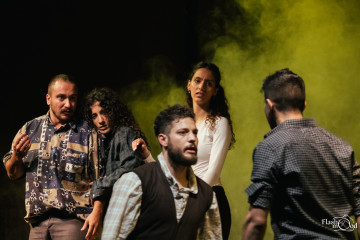

On the stage of the Modern Art Gallery of Catania, Sicily’s second-largest city, six Palestinian circus performers lift and drag a heavy Chinese pole. The group carries it in perfect synergy in a breathtaking display of athleticism and trust among each other.
If one lets go, they will all get hurt. “But we all trust each other. We know we can always count on one another,” Mohamed Abu Taleb, the play's director, tells The New Arab at the end of the 55-minute performance.
It’s a late September night, and over a hundred Italian attendants are here to watch Sarab, a contemporary circus show by the Palestine Circus School (PCS), in astounding silence.
Sarab, the Arabic word for mirage, is the story of the many physical and mental challenges and barriers that refugees face when forced to leave their homeland in search of safety and freedom.
Using ground acrobatics, Chinese poles, aerial acrobatics, self-built tools, dance and theatre elements of contemporary circus, PCS — from the occupied West Bank — talk about their country, the issue of impossible migrations, the denied freedoms and the Israeli occupation.
In one scene, the performers jump from one box to another, making sure not to fall or the ground will swallow them — one of the many physical metaphors the director has used to convey the hardships of refugees’ journeys.
Mirroring their performance, the PCS’s journey to Italy to perform their show was paved with visa challenges and financial obstacles.
“But we made it. Being here is part of the resistance. Art is resistance. Everywhere we go, we hold Palestine with us,” said Mais Rafedie, one of the PCS performers.
For the 10th anniversary of the Ursino Buskers — a festival celebrating street arts at the heart of Sicily — the organisers wondered how they could help highlight the social aspect of contemporary circus.
“We immediately thought about what is happening to Palestinians, and how this form of art can convey important messages through simple body movements. It is a universal language,” said Veronica Palmeri, an activist from Gammazita, the association in charge of organising the festival every year.
Veronica explained how they had already tried inviting the school nine years ago, however, due to "bureaucratic and financial obstacles," they could not bring their show to Sicily.
But the 42-year-old adds that she is happy it all worked out this year, especially as the 7 October anniversary approached, highlighting the need to never stop talking about Palestine in every field.
Since its inception in 2006, the PCS has been challenged for its work of introducing circus arts to Palestinians, often considered "threatening" by Israeli authorities who have tried to put an end to it for simply fighting for a better future for younger generations.
“I have my weapon, which is my art,” said Mohamed. “Art is our way to fight.”
[Flash Mood Photography]
Today PCS is a registered NGO with around 200 trainers and students. It offers young people from the West Bank a safe space to express themselves freely, interact with others, and provide the foundations to develop their artistic and social skills.
“Our goal is not to be super professional but to share a valuable story with people,” said Noor Abo Alrob, another PCS performer.
“Our circus clubs let them express themselves and elaborate [with their bodies] what happens around them. It’s a safe zone from living under pressure all our lives and constantly repressing our feelings.”
The school has become a safe space not only for students but also for trainers, volunteers, families and the communities of the territories in which it operates. PCS members also bring their work to more remote areas, including Tulkarem and the refugee camps, which are most in need of help.
“Through our shows, we proudly make adults cry and children laugh,” Mohamed continued in a bittersweet tone. “It’s a way to bring happiness to children who go through bad stuff all the time. We focus on teaching physical and artistic disciplines, to strengthen both their bodies and minds, and restore their confidence in their own abilities, self-esteem, and the desire to express themselves,” he added.
Between 2020 and 2023, they produced over 10 shows, performed both locally and internationally. “Many have learnt about Palestine since last October, but our problems go way back. Even with our school we often had to cancel our shows because settlers would throw rocks at us,” Hammad Mustafa, a PCS member, said.
“Now they are limiting our movement even more which is disrupting our work, as we often have to reschedule our classes or shows.”
In their first-ever show in Italy, a country that despite its political support to Israel has seen a lot of pro-Palestine shows of solidarity, the PCS has attracted lots of attention.
Gammazita, the hosting organisation, has launched a crowdfunding campaign to keep supporting them, cover the costs of their trip as well as the expensive stage tools, but also sponsor scholarships for those who cannot afford to travel between cities in the West Bank to attend circus classes.
“It meant a lot to bring this show about migration to Sicily more than elsewhere," Mohamed told The New Arab.
"Here people have shown us full support. Being a land of migrant arrivals, the people here know the struggles of people who are forced to leave their homes for a safer place.”
Stefania D'Ignoti is a freelance journalist covering migration and society in Italy and the Middle East
Follow her on X: @stef_dgn







 Follow the Middle East's top stories in English at The New Arab on Google News
Follow the Middle East's top stories in English at The New Arab on Google News


